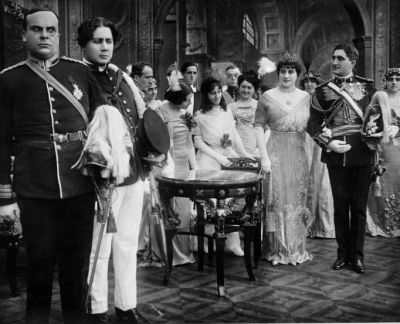
1914. FRA CINEMA E STORIA
Introduce la curatrice Mariann Lewinsky
Accompagnamento al piano di Gabriel Thibaudeau
LA GUERRE DU FEU
(Francia/1914) R.: George Denola. D.: 26'. Did. francesi
T. int.: The Quest for Fire. Sog.: dal romanzo omonimo di J.H. Rosny Aîné. Int.: Georges Dorival (Naoh), Léa Piron, André Simon. Prod.: SCAGL, Pathé
35mm. L.: 525 m. D.: 26' a 18 f/s. Bn. Didascalie francesi / French intertitles
Da: Cinémathèque Française
KAVANA CORSO
(Croazia-Austria-Ungheria/1915) R.: Josip Halla. D.: 2'
T. int: The Café Corso F.: Josip Halla
35mm. L.: 34 m. Bn
Da: Hrvatska Kinoteka, Hrvatski Drzavni Arhiv
DIE KRÖNUNGSFEIERLICHKEITEN IN BUDAPEST AM 30. DEZEMBER 1916
(Ungheria/1916) D.: 17'. Did. tedesche
[Feste per l'incoronazione a Budapest. 30 dicembre 1916]
T. int.: Coronation Festivities in Budapest. Prod: Uher-Filmfabrik
35mm. L.: 358 m. Bn. Didascalie tedesche e ungheresi / German and Hungarian intertitles
Da: Hrvatska Kinoteka, Hrvatski Drzavni Arhiv e Filmarchiv Austria
SKUPŠTINA HHS-A U KOPRIVNICI
(Croazia/1919) R.: Josip Halla. D.: 3'
[Assemblea del Partito croato: Stjepan Radić]
T. int.: The Assembly of the Croatian Peasants Party, led by Stjepan Radić. F.: Josip Halla. Prod.: Josip Halla
35mm. L.: 72 m. Bn
Da: Hrvatska Kinoteka, Hrvatski Drzavni Arhiv
AMOR DI REGINA
(For The Queen's Honour, Italia/1913)
R.: Guido Volante. D.: 34'. Did. inglesi. Digitale
T. int: For The Queen's Honour. Scen.: Arrigo Frusta. Int.: Mary Cléo Tarlarini (la regina Maritza), Orlando Ricci (Ircano III), Alfredo Bertone (Oscar), Oreste Grandi, Cesare Zocchi (un ufficiale), Giovanni Coppo, Carlo Tamburini, Domenico Serra, Cesare Pellegrini, Giulio Conti, Dario Silvestri. Prod.: S.A. Ambrosio
DCP. D.: 34'. Bn e col. Didascalie inglesi / English intertitles
Da: Fondazione Cineteca di Bologna e Museo Nazionale del Cinema. Restaurato nel 2014 a partire da un nitrato della Cinémathèque française / Restored in 2014 from a nitrate print of Cinémathèque française
Bolesław Matuszewski, fotografo e cineasta polacco, dichiarò assai presto che il futuro avrebbe trasformato le fotografie animate del presente in affidabili documenti del passato, permettendo così alle generazioni a venire di essere testimoni oculari della storia (Une nouvelle source de l'histoire,1898). Siamo noi, oggi, quelle generazioni: Matuszewski aveva torto o ragione, o entrambe le cose?
Incontrare i nostri simili nel presente del 1914, mentre ci guardano dritto negli occhi dallo specchio dell'immagine proiettata, è un'esperienza vertiginosa, ma nel senso del tempo più che della storia (Logroño, sus panoramas y bellezas). Per resuscitare la Storia sepolta in tre brevi non-fiction riprese a Zagabria e Budapest, è necessario che già conosciamo la storia della fine dell'Impero austro-ungarico...
C'è qualcosa di molto rinfrescante nel vedere un film di fiction (categoria che, per la sua frivolezza, Matuszewski aveva bandito dai propri progetti) che rappresenta con disinvoltura avvenimenti di 100.000 anni fa, come accade nel primo adattamento di La Guerre du feu. L'eroe si distingue dal nostro maschio preistorico standard per via d'un taglio di capelli più civilizzato (forse più francese?).
Tornando alle cose future, il cinema qualche volta ne capta l'odore in modi misteriosi; nel 1913-14 diversi drammi realizzati in Germania, Francia e Italia proponevano oscure visioni di disordine politico e di guerra, che presto sarebbero diventate realtà. Amor di regina di Guido Volante, con Mary Cléo Tarlarini nel ruolo d'una regina in esilio dopo un colpo di stato, appartiene al gruppo. Volante restò ucciso sul campo di battaglia.
Mariann Lewinsky
Bolesław Matuszewski, a Polish photographer and cinematographer, declared very early on that the future would transform the living pictures of the present into truthful documents of the past, thus allowing later generations to be eyewitnesses to history directly (A New Source of History, 1898). We are those future generations, now - was he right or wrong, or both?
To meet our fellow humans from the present of 1914, gazing straight at us from the mirror of the projected image, is a heady experience, but of time, and not of history (Logroño, sus panoramas y bellezas). To resuscitate History buried in three short non-fiction film from Zagreb and Budapest, we need to know the story of the end of the Austro-Hungarian Empire.
Then it is most refreshing to see how a fiction film (Matuszewski banned this frivolous category from his projects) unselfconsciously presents happenings of 100,000 years ago, as does the first adaptation of La Guerre du feu (The Quest of Fire). The hero is distinguished from your average prehistoric male by a more civilized (and maybe more French?) haircut.
Turning to things to come, cinema sometimes picks up the scent of the near future in an uncanny way; in 1913-1914 several drama films in Germany, France, and Italy projected dark visions of political turmoil and war, which were soon to become reality. Belonging to this group is Guido Volante's Amor di regina, starring Mary Cléo Tarlarini as a queen driven into exile by a coup d'état. Volante was killed in the war.
Mariann Lewinsky

Tariffe:

Numero posti: 174
Aria Condizionata
Accesso e servizi per disabili
Il nostro cinema aderisce al circuito CinemAmico: è possibile utilizzare l’applicazione MovieReading® per i film di cui è prevista audiodescrizione e/o sottotitolazione sull'applicazione.
Tel. 051 2195311











